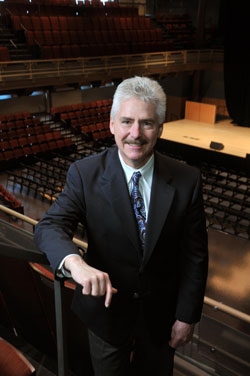Through live performances, Kreinbergbroadens students’ appreciation for music
From jazz and Broadway standards to opera and chamber music, Steven Kreinberg’s “Art of Listening” course takes students outside of their normal listening routine and broadens their appreciation for music of many genres.
“This is the course I’ve always wanted to teach,” said Kreinberg, associate professor of music history in the Boyer College of Music and Dance. “When I began my collegiate teaching career, I felt that it was sufficient for me to be a ‘sage on the stage,’ in that I would explain concepts and have students return them to me through papers and examinations. But now,
I realize that experiential learning is a much deeper form of learning. This course helps students broaden their palette of music listening and enjoyment by exposing them first-hand to all kinds of music genres that they may never have considered otherwise.”
For his work in establishing the course, Kreinberg, who has taught music history and music appreciation courses for more than 30 years, has been awarded the Provost’s Award for Innovative Teaching in General Education. He says students absorb complex subjects when they are able to experience them first-hand.
For students in Kreinberg’s award-winning course, riding a crowded subway to a Center City arts venue, wearing the proper attire and striking-up conversations with other concert-goers while waiting in a concert hall lobby are just as important to the learning process as identifying the work of classical composers and describing the kinds of music they are hearing.
“We learn by living, rather than memorizing; by experiencing rather than watching passively on the sidelines,” he said. “Through experiential learning students dig deeper and make stronger connections. The enjoyment becomes much more meaningful.”
While most students might prefer the work of Lady Gaga to French composer François-Joseph Gossec, Kreinberg believes the right level of exposure and a knowledgeable guide can open their minds to a whole new variety of genres.
After experiencing a live performance, says Kreinberg, students often return concert reports that reflect how much they now also enjoy classical music, Broadway musicals and jazz.
“I always tell my students that I have nothing against popular music; I think it’s terrific … But it has its purpose. This is a different kind of experience,” said Kreinberg.
At a time when support for arts education is waning and young people are losing touch with their cultural roots, the “Art of Listening” course is an important component in creating a well-rounded learning environment, said Jerek Ervin, a master’s degree candidate.
“The course’s power comes from the way in which Dr. Kreinberg engages his students,” said Ervin. “(He shows) them that classical music, Broadway, and jazz are not only genres of music, but also living and vibrant social practices that surround us all.”
